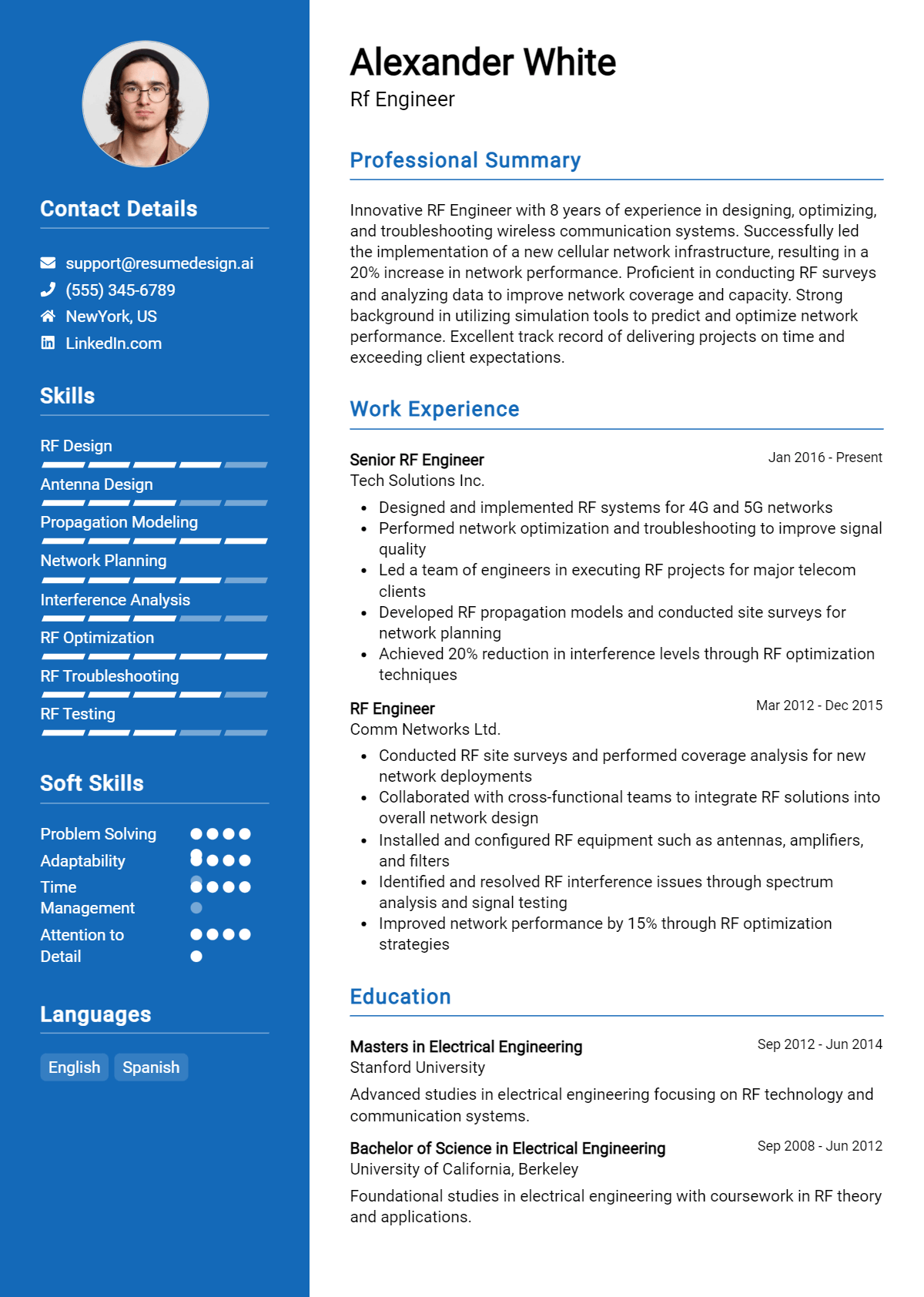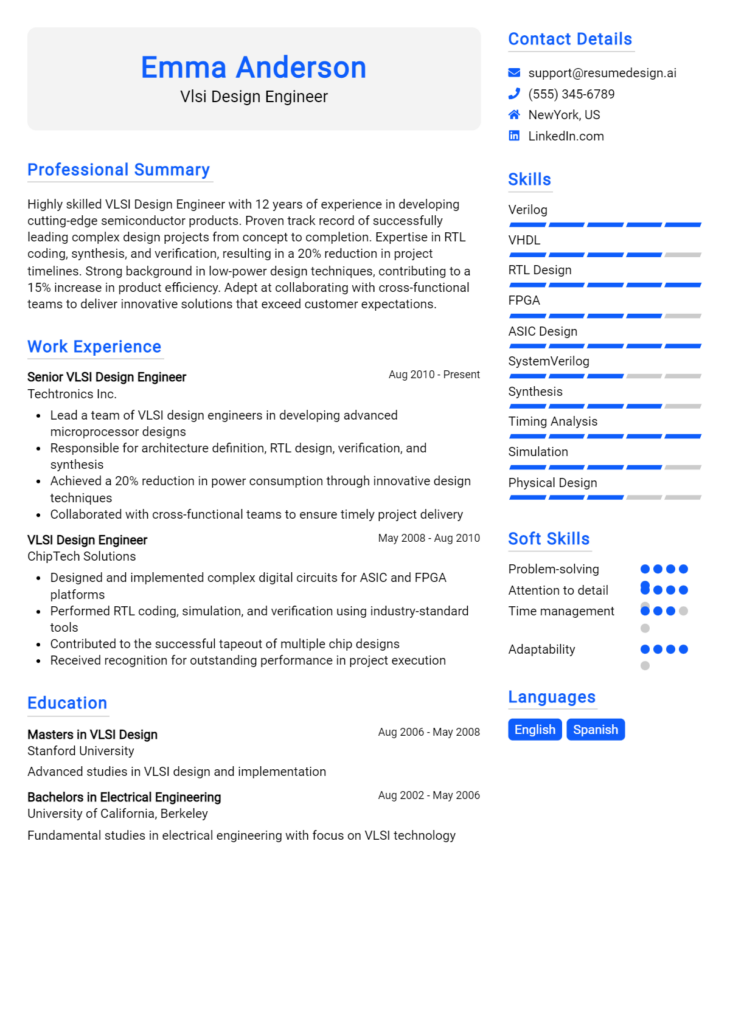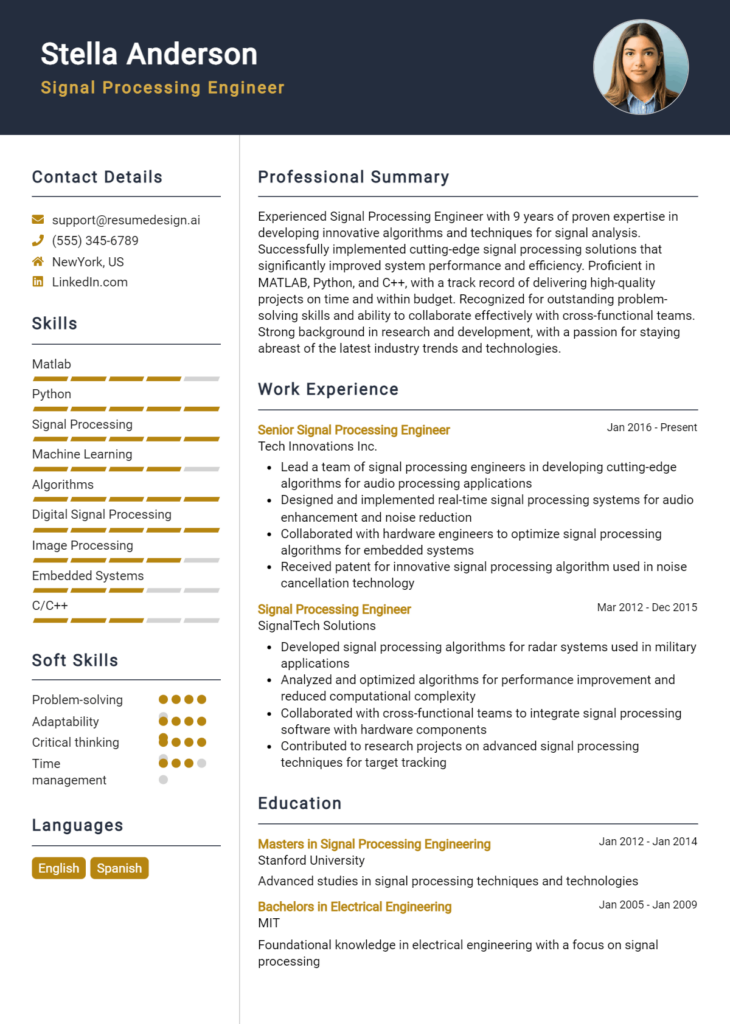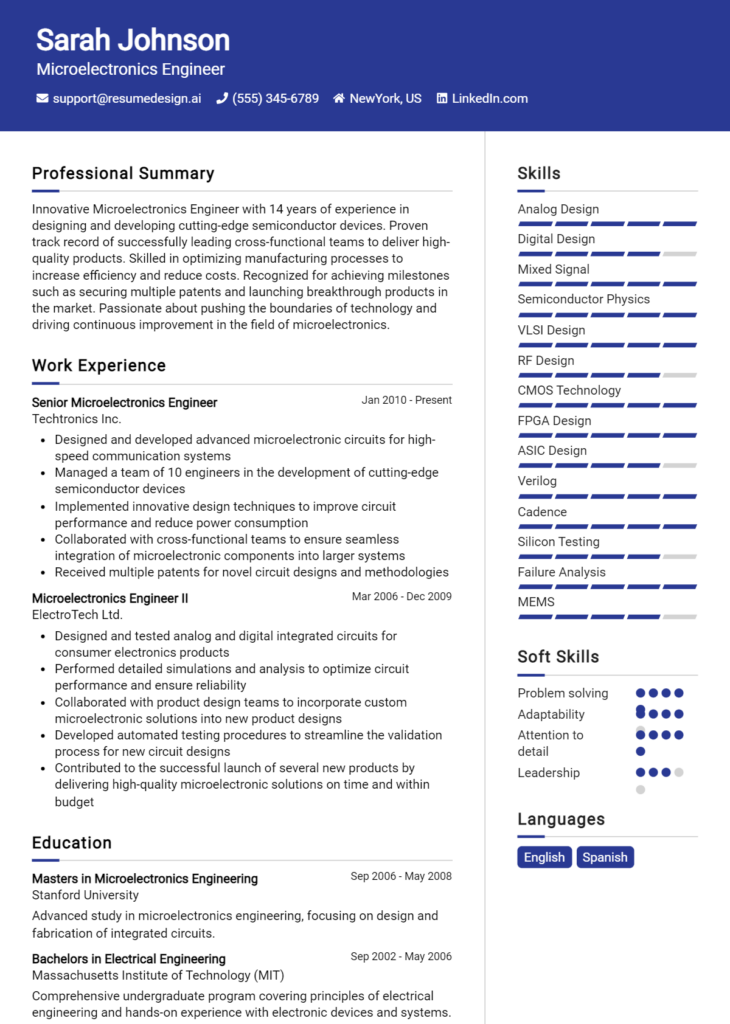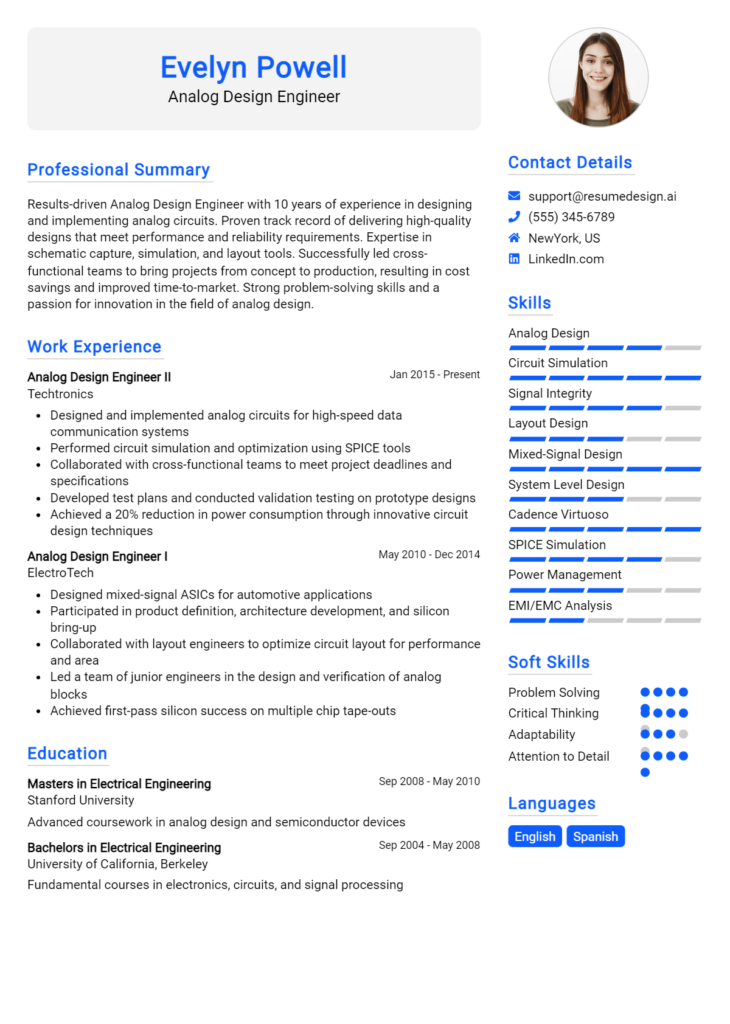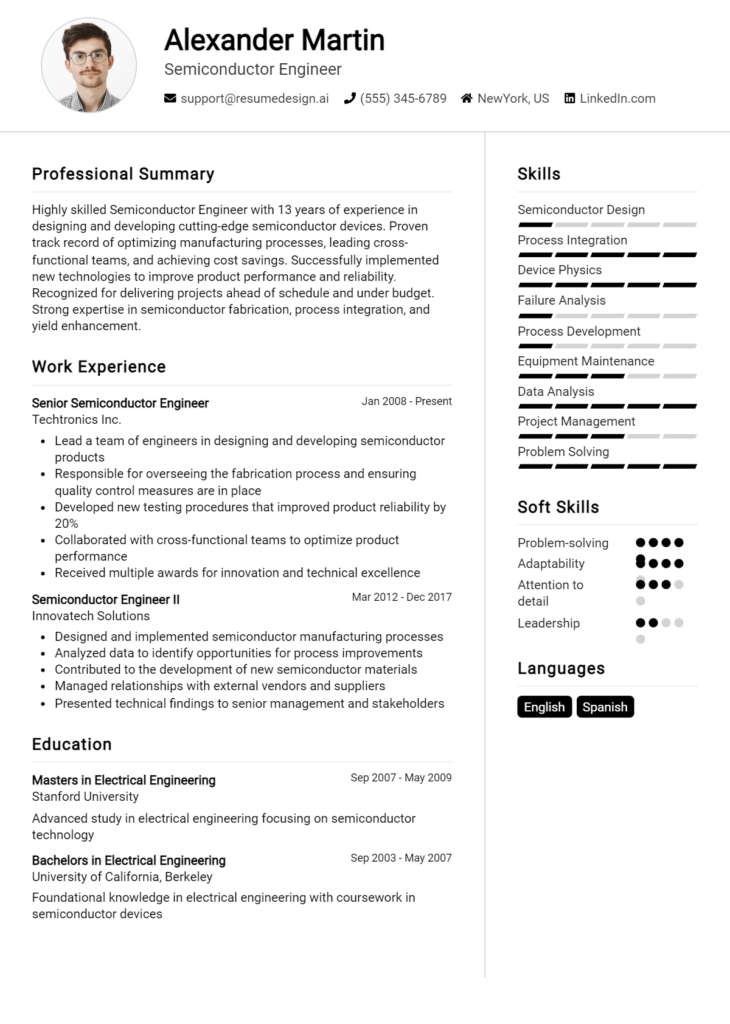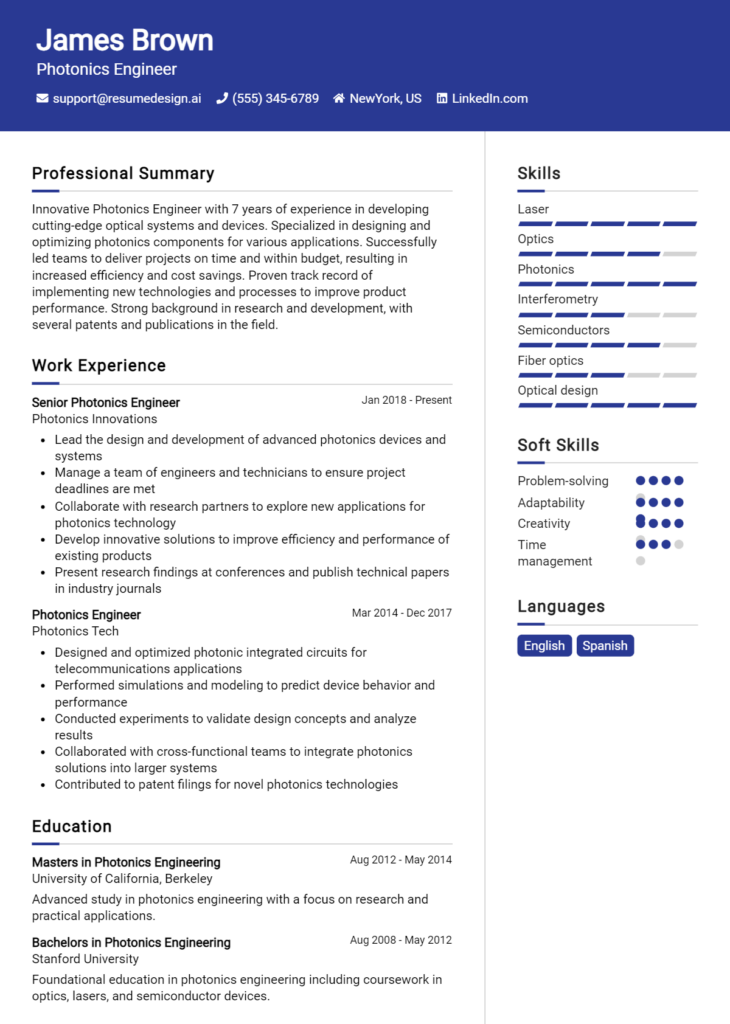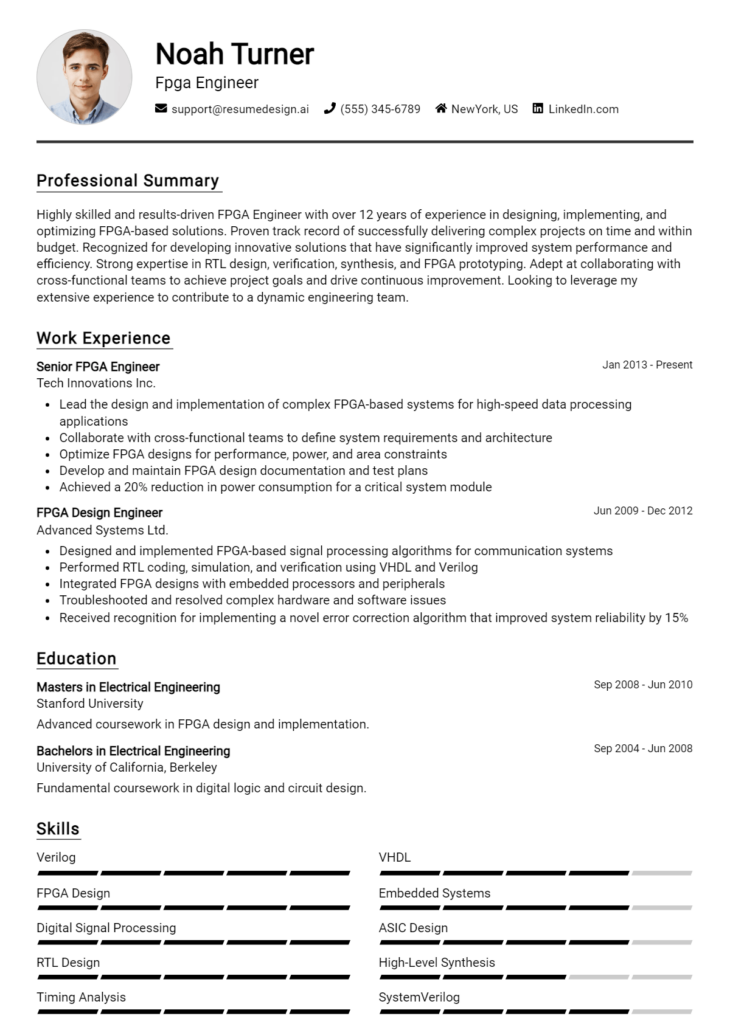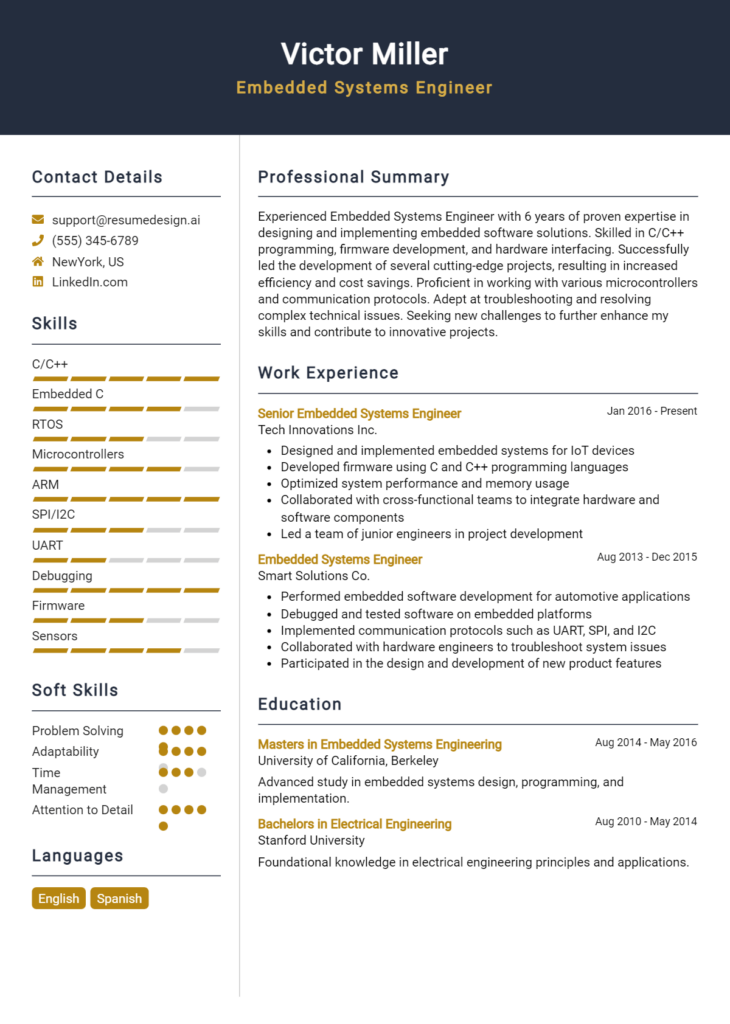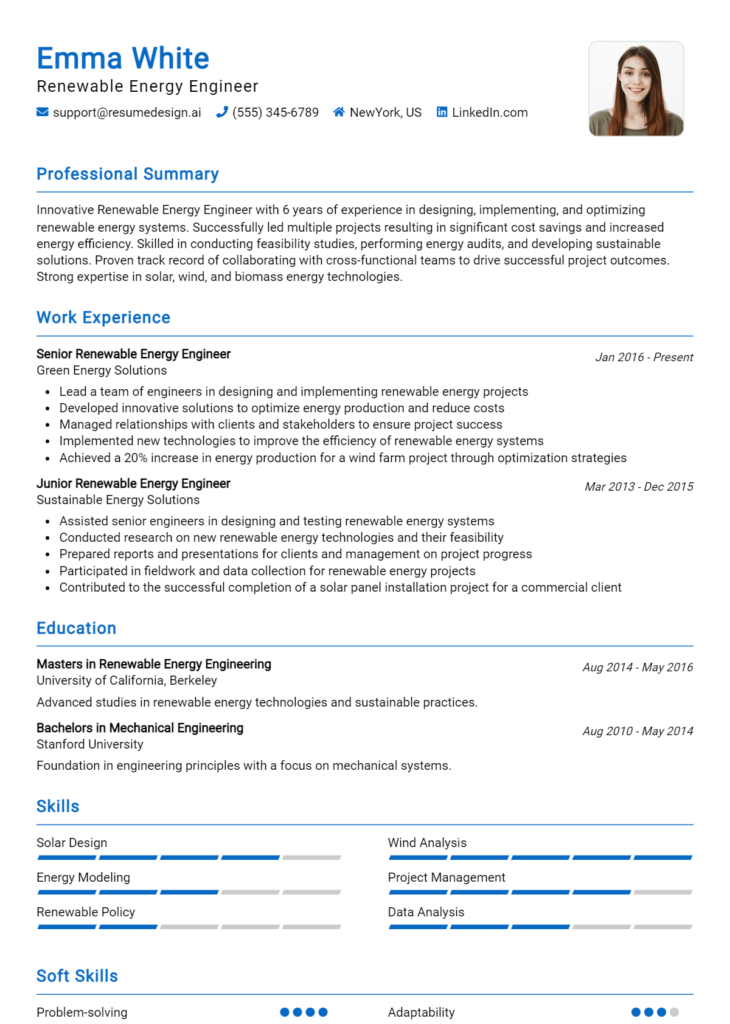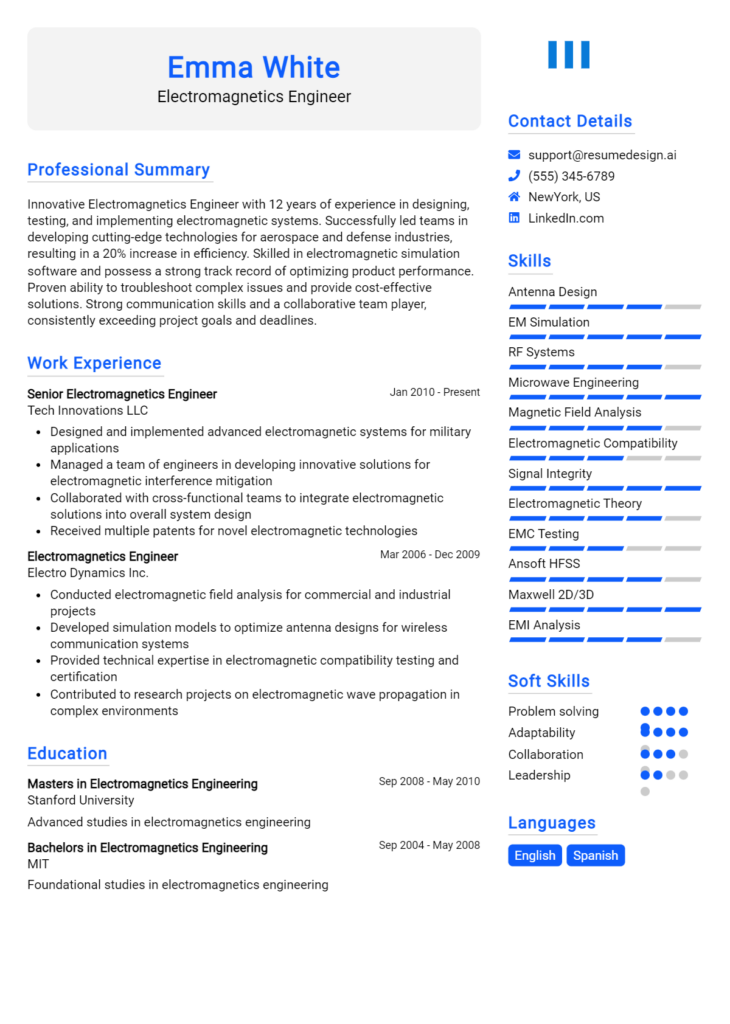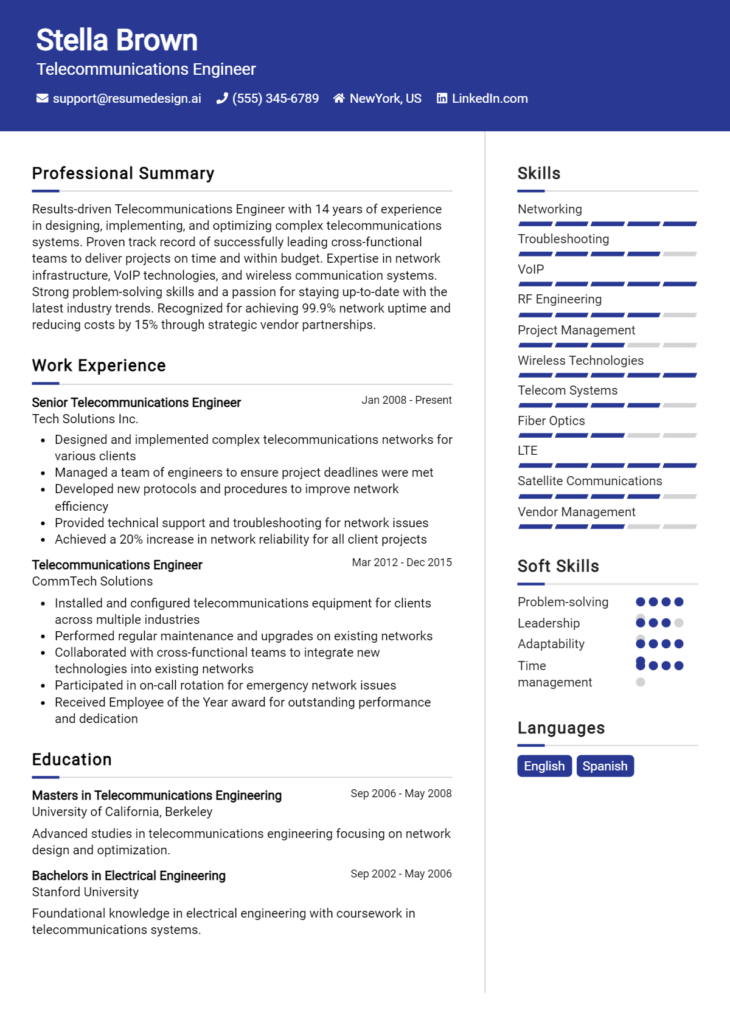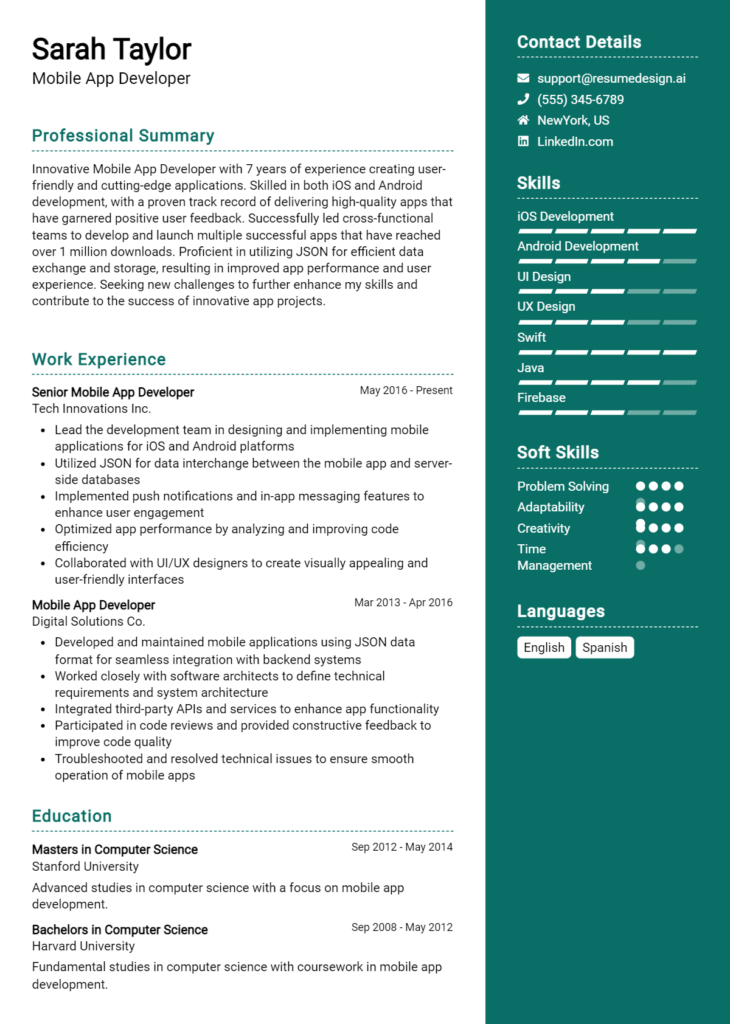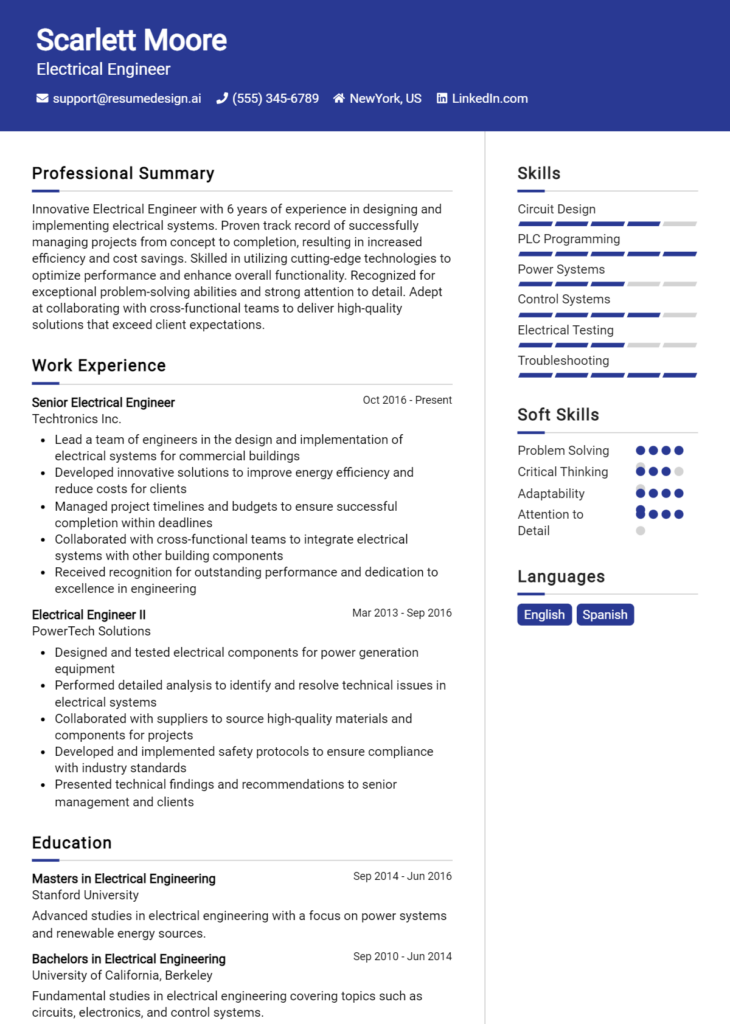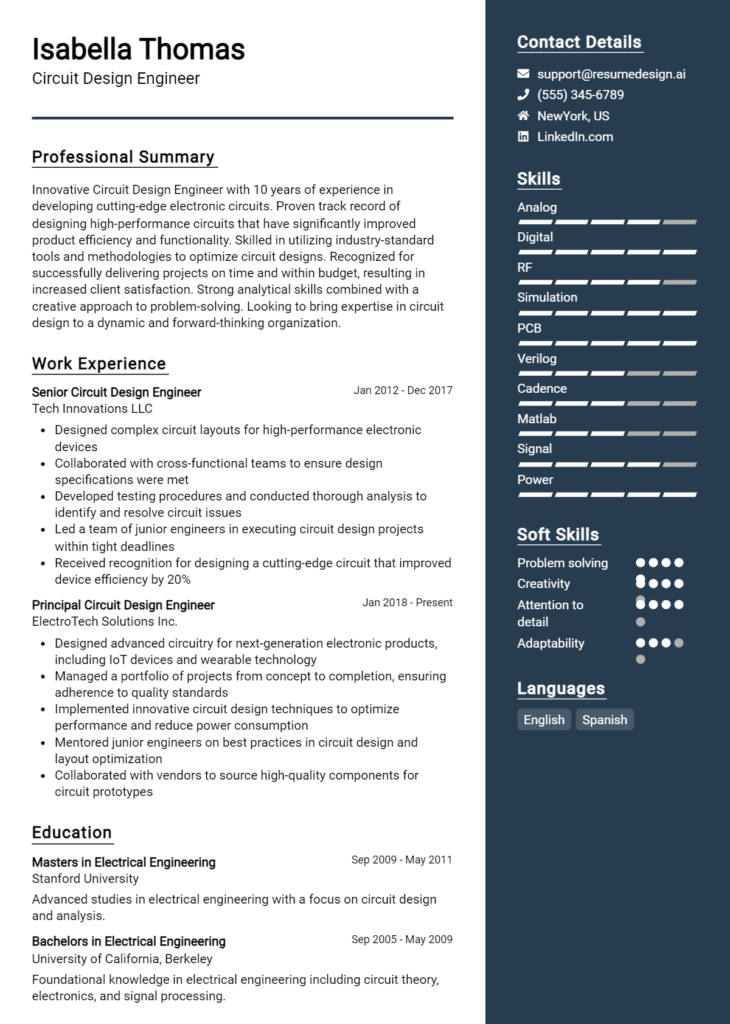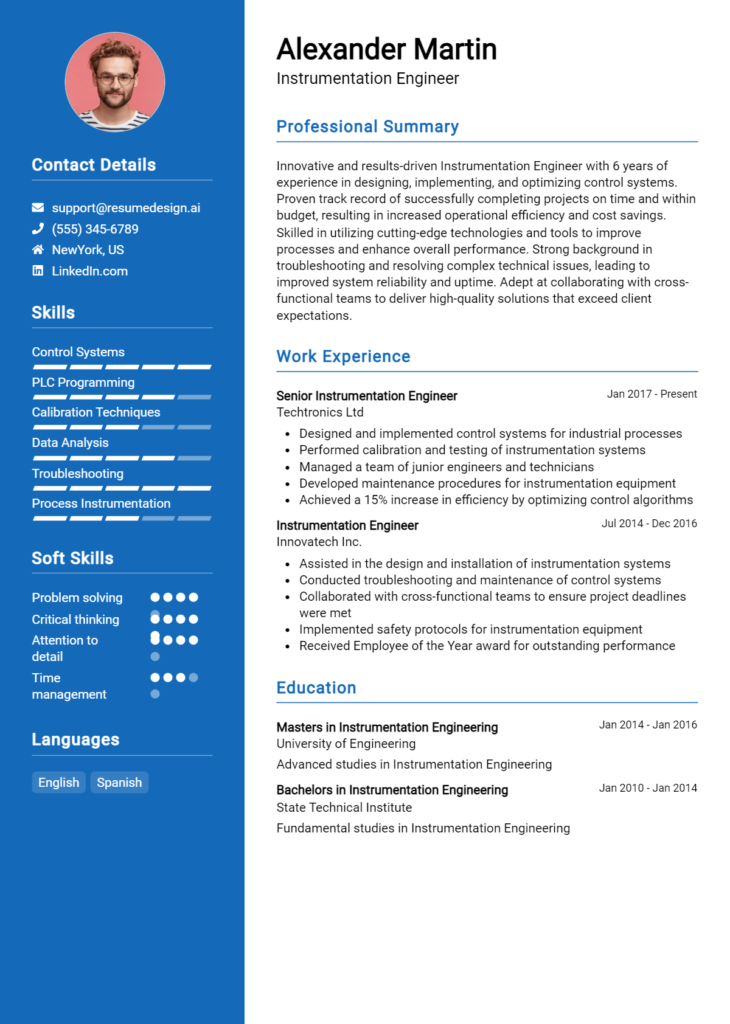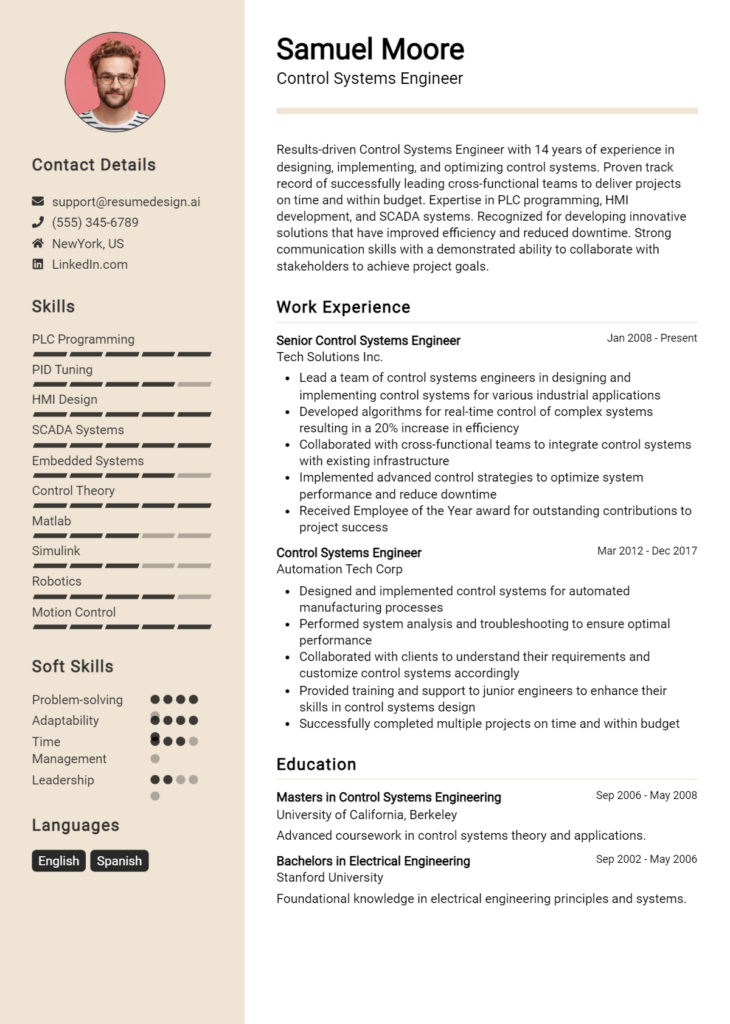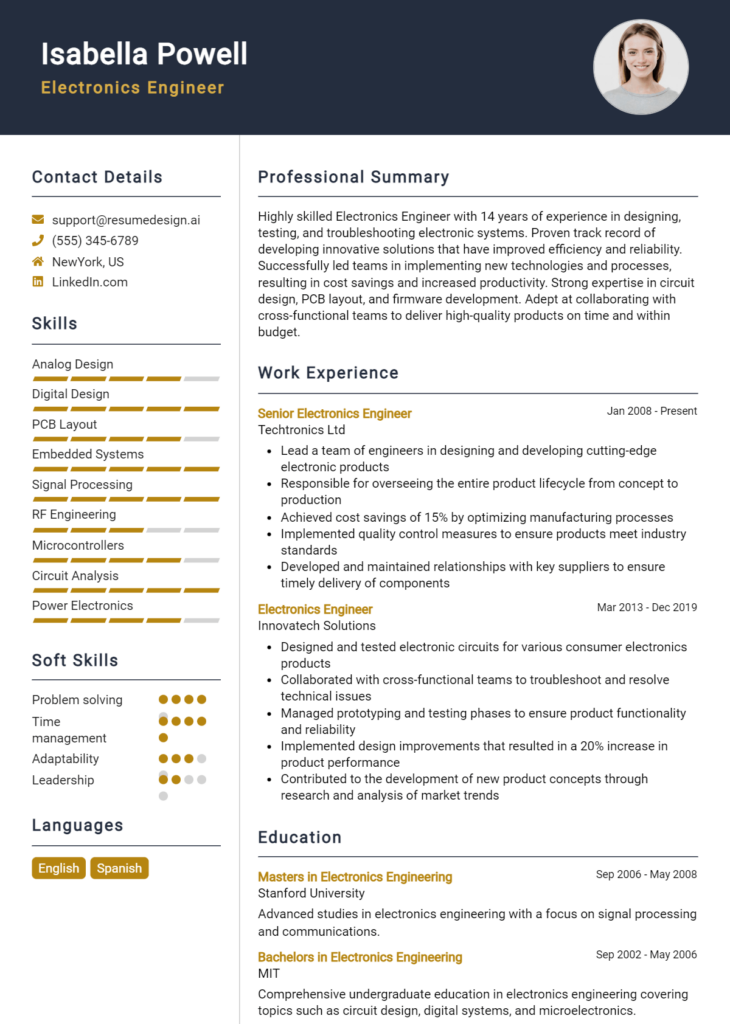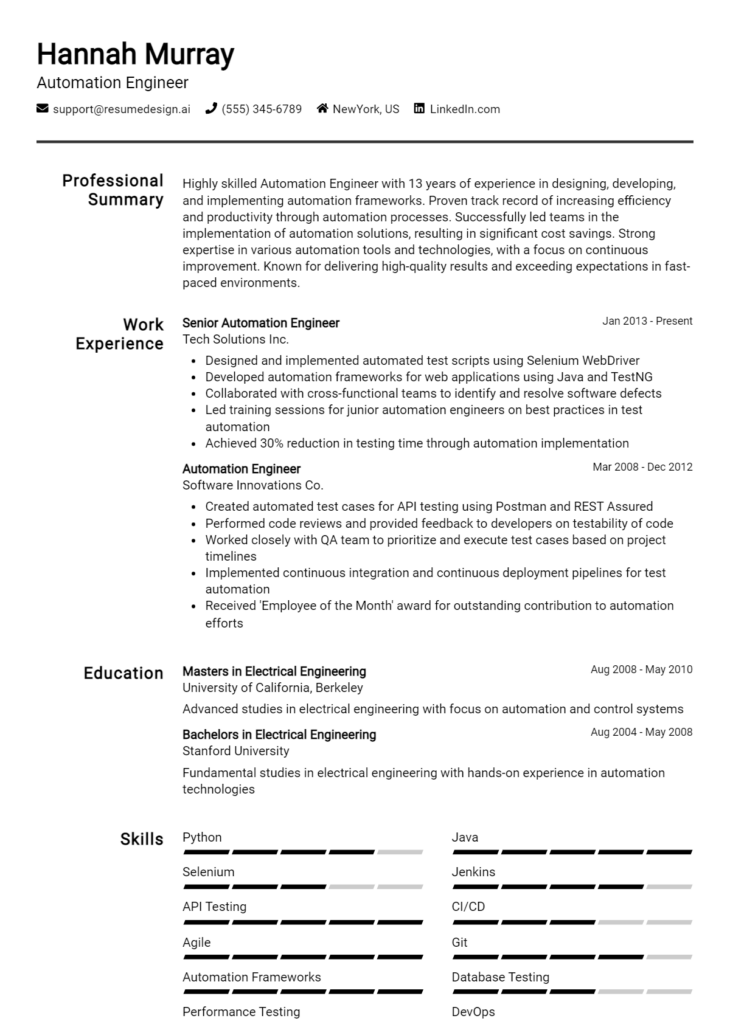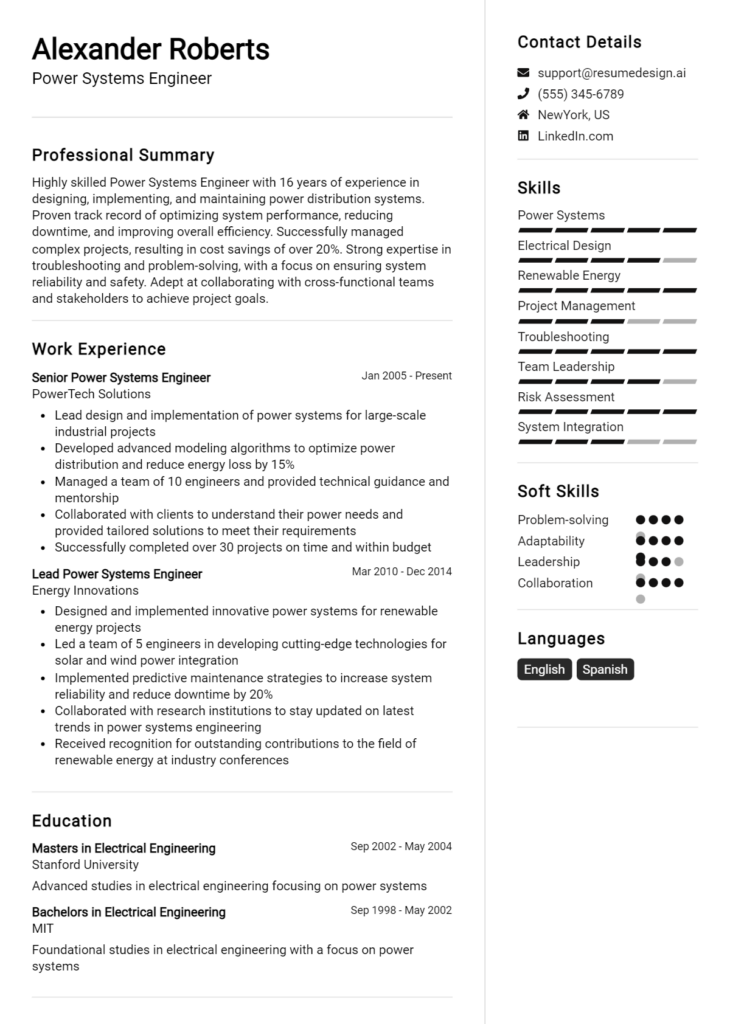RF Engineer Core Responsibilities
The RF Engineer plays a crucial role in designing, developing, and optimizing radio frequency systems, bridging various departments such as engineering, manufacturing, and quality assurance. Key responsibilities include conducting RF simulations, troubleshooting communication systems, and ensuring regulatory compliance. Strong technical skills in circuit design, operational expertise in testing methodologies, and adept problem-solving abilities are essential for success. These competencies contribute significantly to the organization’s goals by enhancing product performance. A well-structured resume can effectively highlight these qualifications, showcasing the candidate's readiness to drive innovation.
Common Responsibilities Listed on RF Engineer Resume
- Design and develop RF circuits and systems.
- Conduct performance testing and optimization of RF devices.
- Collaborate with cross-functional teams to integrate RF solutions.
- Analyze and troubleshoot RF communication issues.
- Ensure compliance with industry standards and regulations.
- Utilize simulation software for RF modeling.
- Prepare technical documentation and reports.
- Participate in design reviews and project planning.
- Stay updated on emerging RF technologies and trends.
- Implement improvements for existing RF systems.
- Support the manufacturing process with RF production tests.
- Train and mentor junior engineers on RF principles.
High-Level Resume Tips for RF Engineer Professionals
In the competitive field of RF Engineering, a well-crafted resume is essential for standing out among a pool of qualified candidates. Your resume often serves as the first impression you make on potential employers, and it needs to effectively communicate not only your technical skills but also your professional achievements. A polished resume should highlight your expertise in RF design, testing, and implementation, reflecting your ability to contribute to innovative projects. In this guide, we will provide practical and actionable resume tips specifically tailored for RF Engineer professionals to help you showcase your unique qualifications and secure that coveted job opportunity.
Top Resume Tips for RF Engineer Professionals
- Tailor your resume to match the job description, emphasizing relevant skills and experiences that align with the specific requirements of the position.
- Showcase your technical expertise by including industry-specific terms and technologies, such as RF circuit design, antenna theory, and signal processing.
- Quantify your achievements by using metrics and data, such as improvements in efficiency, reduction in costs, or successful project completions.
- Highlight relevant experience in both professional roles and academic projects, demonstrating your hands-on experience in RF applications.
- Include certifications and training relevant to RF Engineering, such as those from IEEE or specialized RF design software.
- Utilize a clean and organized layout, making it easy for hiring managers to quickly identify key information.
- Incorporate keywords from the job posting to increase the chances of passing through automated resume screening software.
- Showcase soft skills such as teamwork, communication, and problem-solving, as these are crucial in collaborative engineering environments.
- List any relevant publications or patents that demonstrate your contributions to the field of RF Engineering.
- Keep your resume concise and focused, ideally limited to one or two pages, to ensure that hiring managers can efficiently review your qualifications.
By implementing these tips, you can significantly enhance your resume, making it a powerful tool in your job search. A well-structured and tailored resume not only highlights your qualifications but also increases your chances of standing out to potential employers in the RF Engineer field. With the right approach, you can effectively communicate your value and land that desirable position.
Why Resume Headlines & Titles are Important for RF Engineer
In the competitive field of RF engineering, a well-crafted resume headline or title is crucial for making a strong first impression. This succinct phrase serves as a snapshot of a candidate's qualifications and expertise, immediately grabbing the attention of hiring managers who often sift through numerous applications. A powerful headline effectively summarizes the applicant’s key strengths and aligns them with the specific requirements of the job, ensuring relevance and impact. By being concise yet descriptive, a compelling resume title can set the tone for the rest of the application, enticing recruiters to delve deeper into the candidate’s qualifications.
Best Practices for Crafting Resume Headlines for RF Engineer
- Keep it concise: Aim for no more than 10-15 words.
- Be role-specific: Tailor the headline to the RF engineering position you are applying for.
- Highlight key skills: Incorporate relevant technical skills that align with the job description.
- Showcase accomplishments: Mention any significant achievements or certifications.
- Use industry terminology: Employ specific jargon that resonates with hiring managers in the RF field.
- Maintain professionalism: Ensure the tone is formal and appropriate for the engineering sector.
- Avoid clichés: Steer clear of overused phrases that lack originality.
- Incorporate numbers: If applicable, include metrics or statistics to quantify your achievements.
Example Resume Headlines for RF Engineer
Strong Resume Headlines
"Innovative RF Engineer with 7+ Years of Experience in Wireless Communication Systems"
“Results-Driven RF Engineer Specializing in Antenna Design and Optimization”
“Certified RF Engineer with Proven Track Record in Signal Processing and Testing”
“Dynamic RF Engineer Experienced in Developing Cutting-Edge Telecommunication Solutions”
Weak Resume Headlines
“Engineer Looking for Opportunities”
“Experienced Professional”
Strong headlines are effective because they are specific, clearly articulating the candidate's expertise and aligning their skills with the needs of the employer. They convey confidence and relevance, making it easy for hiring managers to see the value the candidate brings. In contrast, weak headlines lack detail and fail to capture the candidate’s unique strengths, making them forgettable and ineffective in a competitive job market. A strong headline not only highlights qualifications but also demonstrates a clear understanding of the RF engineering field, setting the stage for a compelling resume.
Writing an Exceptional RF Engineer Resume Summary
A well-crafted resume summary is crucial for RF Engineers as it serves as the first impression for hiring managers. In a competitive job market, a strong summary quickly captures attention by effectively showcasing key skills, relevant experience, and notable accomplishments specific to the RF engineering field. This concise yet impactful section should be tailored to align with the job description, highlighting the candidate's unique value proposition and making a compelling case for why they are a perfect fit for the role.
Best Practices for Writing a RF Engineer Resume Summary
- Quantify Achievements: Use numbers and metrics to demonstrate the impact of your work.
- Focus on Key Skills: Highlight technical proficiencies relevant to RF engineering, such as RF circuit design or signal processing.
- Tailor for the Job Description: Customize your summary to reflect the specific requirements and keywords in the job listing.
- Be Concise: Aim for 3-5 sentences that clearly communicate your qualifications without unnecessary jargon.
- Highlight Relevant Experience: Mention specific projects or roles that showcase your expertise in RF engineering.
- Use Action Verbs: Start sentences with strong action verbs to convey a sense of proactivity and achievement.
- Showcase Certifications: If applicable, include relevant certifications that enhance your credibility as an RF engineer.
- Convey Passion: Briefly express your enthusiasm for RF engineering and how it drives your professional journey.
Example RF Engineer Resume Summaries
Strong Resume Summaries
Results-driven RF Engineer with over 8 years of experience in designing and optimizing wireless communication systems. Successfully led a team to reduce signal interference by 40%, enhancing overall system performance for a major telecommunications provider.
Skilled RF Engineer specializing in RF circuit design and testing, with a proven track record of developing innovative solutions that improved system reliability by 30%. Expertise in using advanced simulation tools such as ADS and HFSS.
Dedicated RF Engineer with a Master’s degree in Electrical Engineering and 5 years of experience in RF system development. Played a key role in launching a new 5G network, achieving a 25% increase in data throughput and customer satisfaction ratings.
Weak Resume Summaries
Experienced engineer looking for a new opportunity in RF engineering.
RF Engineer with general knowledge in the field and some work experience.
The strong resume summaries stand out due to their clear articulation of specific achievements and relevant skills, providing quantifiable results that demonstrate the candidate's impact in previous roles. In contrast, the weak summaries are vague and lack measurable outcomes, making it difficult for hiring managers to gauge the candidate's potential value to the organization. By focusing on the unique strengths and accomplishments, the strong summaries create a compelling narrative that aligns with the demands of the RF engineering position.
Work Experience Section for RF Engineer Resume
The work experience section of an RF Engineer resume plays a crucial role in demonstrating a candidate's technical capabilities and practical application of their skills in real-world scenarios. This section not only highlights a candidate's proficiency in RF design and analysis but also showcases their ability to manage teams and deliver high-quality products within set deadlines. By quantifying achievements and aligning past experiences with industry standards, candidates can effectively illustrate their impact in previous roles, making them more appealing to potential employers.
Best Practices for RF Engineer Work Experience
- Clearly articulate technical skills relevant to RF engineering, such as circuit design, simulation software, and compliance testing.
- Quantify achievements where possible, such as percentage improvements in efficiency or cost savings.
- Highlight leadership roles and team collaboration experiences to demonstrate your ability to manage projects and work with cross-functional teams.
- Align your experiences with industry standards to showcase familiarity with current technologies and methodologies.
- Use action verbs to convey your contributions and impact in previous positions.
- Include specific technologies, tools, and methodologies employed in your projects to emphasize your expertise.
- Tailor your work experience to the job description, highlighting the most relevant experiences for the position you are applying for.
- Maintain a clear and organized format that makes it easy for hiring managers to assess your qualifications quickly.
Example Work Experiences for RF Engineer
Strong Experiences
- Led a team of 5 engineers in the design and implementation of a new RF amplifier, resulting in a 30% increase in signal strength and a 20% reduction in manufacturing costs.
- Developed and executed comprehensive testing protocols for RF modules, achieving compliance with industry standards and reducing time-to-market by 15%.
- Collaborated with cross-functional teams to integrate RF components into a new product line, contributing to a successful launch that generated $1M in revenue within the first quarter.
Weak Experiences
- Worked on RF projects with a team.
- Involved in testing and design processes.
- Participated in meetings and discussions about RF engineering.
The examples provided illustrate the difference between strong and weak experiences. Strong experiences are characterized by specific achievements, quantifiable outcomes, and a clear demonstration of leadership and collaboration. They convey a sense of impact and relevance to the RF engineering field. In contrast, weak experiences lack detail and do not provide a clear picture of the candidate's contributions or the skills they utilized, making it difficult for employers to assess their qualifications effectively.
Education and Certifications Section for RF Engineer Resume
The education and certifications section of an RF Engineer resume plays a critical role in showcasing the candidate's academic background and professional qualifications. This section not only highlights degrees and relevant coursework but also emphasizes industry-recognized certifications and ongoing professional development efforts. By providing details on specialized training and certifications, candidates can significantly enhance their credibility and demonstrate their alignment with the job requirements. In a rapidly evolving field like RF engineering, showcasing a commitment to continuous learning is essential for standing out in a competitive job market.
Best Practices for RF Engineer Education and Certifications
- Include only relevant degrees and certifications that pertain to RF engineering or related fields.
- List your highest degree first, followed by any additional relevant qualifications.
- Specify the institution and dates attended, ensuring clarity and credibility.
- Highlight advanced certifications from recognized industry bodies, such as IEEE or the Society of Automotive Engineers (SAE).
- Include specific coursework that relates directly to RF engineering principles and practices.
- Consider including any relevant workshops or training programs that demonstrate continuous learning.
- Avoid excessive detail on unrelated educational experiences or certifications.
- Use bullet points for clarity and to make the section easy to skim by hiring managers.
Example Education and Certifications for RF Engineer
Strong Examples
- B.S. in Electrical Engineering, University of California, Berkeley, 2021
- Certified RF Engineer (CRFE), RF Engineering Association, 2022
- Relevant Coursework: Advanced RF Circuit Design, Wireless Communication Systems, Electromagnetic Theory
- Professional Development: 5G Technology Workshop, 2023
Weak Examples
- B.A. in History, State University, 2018
- Certification in Basic IT Skills, Online Course Provider, 2020
- Relevant Coursework: Introduction to Psychology, 2019
- Certification in Microsoft Office Suite, 2021
The examples provided are considered strong because they directly pertain to the field of RF engineering, showcasing relevant degrees, certifications, and coursework that align with the skills needed for the role. In contrast, the weak examples lack relevance to RF engineering and demonstrate a lack of focus on the specific qualifications needed for success in this area. They highlight outdated or unrelated educational experiences that do not enhance the candidate's suitability for the position.
Top Skills & Keywords for RF Engineer Resume
In the competitive field of RF engineering, showcasing the right skills on your resume is vital for standing out to potential employers. RF engineers play a crucial role in designing, developing, and optimizing radio frequency systems, which makes it essential to highlight both technical expertise and interpersonal abilities. A well-crafted resume that includes a blend of hard and soft skills not only demonstrates your technical proficiency but also your capacity to work collaboratively, solve problems, and adapt to new challenges. By clearly outlining these skills, you can effectively convey your qualifications and readiness for the role, making it easier for hiring managers to see the value you bring to their organization.
Top Hard & Soft Skills for RF Engineer
Soft Skills
- Communication Skills
- Team Collaboration
- Problem-Solving Ability
- Adaptability
- Critical Thinking
- Time Management
- Attention to Detail
- Project Management
- Creativity
- Interpersonal Skills
Hard Skills
- RF Circuit Design
- Antenna Theory and Design
- Signal Processing
- RF Testing and Measurement
- Electromagnetic Compatibility (EMC)
- Software Defined Radio (SDR)
- MATLAB/Simulink Proficiency
- PCB Design and Layout
- RF Simulation Tools (e.g., HFSS, ADS)
- Knowledge of Telecommunications Standards
- Frequency Spectrum Management
- Wireless Communication Technologies
- Modulation Techniques
- Networking Protocols
- Proficient in Lab Equipment (e.g., Spectrum Analyzers, Oscilloscopes)
For more insights on enhancing your resume, check out our skills and work experience sections.
Stand Out with a Winning RF Engineer Cover Letter
I am excited to apply for the RF Engineer position at [Company Name], as advertised on [Job Board/Company Website]. With a Bachelor’s degree in Electrical Engineering and over [X years] of hands-on experience in RF design and testing, I am confident in my ability to contribute effectively to your team. My background includes extensive work with RF circuit design, signal processing, and electromagnetic compatibility, which I believe aligns well with the innovative projects at [Company Name].
In my previous role at [Previous Company Name], I successfully developed and optimized RF circuits for [specific applications or products], leading to a [specific percentage]% improvement in performance. I am skilled in using industry-standard simulation tools such as ADS and HFSS, as well as conducting extensive laboratory testing to ensure compliance with regulatory standards. My commitment to quality and precision has allowed me to contribute to projects that not only meet client specifications but also exceed their expectations.
Collaboration is key in engineering, and I pride myself on my ability to work effectively within cross-functional teams. I have collaborated closely with software engineers, product managers, and manufacturing teams to bring innovative RF solutions to market quickly and efficiently. I am particularly drawn to [Company Name] because of your dedication to pushing the boundaries of technology, and I am eager to bring my expertise in RF engineering to help advance your initiatives.
Thank you for considering my application. I am looking forward to the opportunity to discuss how my experience and passion for RF engineering can contribute to the continued success of [Company Name]. Please feel free to contact me at your convenience to schedule a conversation.
Common Mistakes to Avoid in a RF Engineer Resume
When crafting a resume for an RF Engineer position, it’s crucial to present your skills and experiences effectively. However, many candidates make common mistakes that can hinder their chances of landing an interview. Avoiding these pitfalls can significantly enhance the clarity and appeal of your resume, making it stand out to hiring managers in the competitive field of radio frequency engineering.
Lack of Relevant Keywords: Failing to include industry-specific keywords can lead to your resume being overlooked by Applicant Tracking Systems (ATS) that filter resumes based on keywords.
Overly Technical Jargon: While technical expertise is vital, using excessive jargon without context can confuse hiring managers who may not have a deep understanding of RF concepts.
Ignoring Soft Skills: RF Engineers often collaborate with cross-functional teams. Not highlighting soft skills like communication and teamwork can make your resume less appealing.
Vague Job Descriptions: Providing unclear or generic job descriptions can fail to demonstrate your specific contributions and achievements in previous roles.
Neglecting Certifications and Education: Omitting relevant certifications (such as FCC licenses or specialized RF training) or educational qualifications can leave out crucial information that sets you apart from other candidates.
Poor Formatting and Structure: A cluttered or unorganized resume can be difficult to read. Consistent formatting and clear section headings are essential for presenting your information effectively.
Not Tailoring the Resume for Each Application: Sending the same resume for different job applications can show a lack of interest. Tailoring your resume to align with the specific requirements of each job increases your chances of impressing hiring managers.
Focusing Solely on Technical Skills: While technical skills are important, a balanced resume that also highlights project management, problem-solving, and analytical skills can provide a more well-rounded picture of your capabilities.
Conclusion
As we explored the essential skills and responsibilities of an RF Engineer, it’s clear that this role demands a unique blend of technical expertise, problem-solving abilities, and communication skills. Key areas of focus for RF Engineers include:
- Proficiency in RF design and analysis, including knowledge of RF circuit components.
- Familiarity with various testing equipment and tools used to optimize RF systems.
- Strong understanding of electromagnetic theory and wireless communication principles.
- Ability to collaborate effectively with cross-functional teams to develop innovative solutions.
Given the highly specialized nature of this field, having a standout resume is crucial in showcasing your qualifications and experience. If you’re looking to enhance your job prospects and make a lasting impression on potential employers, now is the perfect time to review and update your RF Engineer resume.
To assist you in this process, take advantage of the various resources available at your fingertips. Utilize resume templates to create a polished and professional layout. Explore the resume builder that allows you to seamlessly input your information and customize it to fit your style. Additionally, check out resume examples for inspiration on how to effectively highlight your skills and achievements. Don’t forget to pair your resume with a compelling cover letter using cover letter templates that can help you stand out even further.
Take the initiative today and ensure your application materials reflect your capabilities as an RF Engineer!

